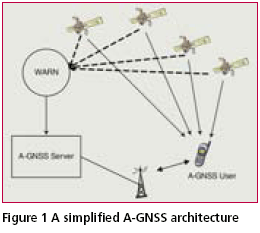Articles in the Articles Category
January 2008
Institute of navigation national technical Meeting
January,28-30, 2007,
San Diego, California, USA
www.ion.org
February 2008
Mobile World congress 2008
February 11 – 14,
Barcelona, Spain
www.mobileworldcongress.com
Munich satellite navigation summit
19 – 21 February, 2008,
Residenz München, Germany
http://www.munich-satellitenavigationsummit.org/
GSDI-10 St.Augustine, Trinidad
February 25-29, 2008
http://www.gsdi.org/gsdi10/
NavtechGPS Seminars
February 25-29, 2008
New Orleans, LA
PWitt@navtechgps.com
March 2008
CeBIT
March 4-9,
Hannover Germany
www.cebit.de
WAlIS Forum 2008
March 12-14,
Perth, Western Australia
forum@walis.wa.gov.au
http://www.walis.wa.gov.au/forum
April 2008
GEO-SIBERIA 2008
April 22 – 24, 2008,
Novosibirsk , Russia,
strutz@sibfair.ru
http://geosiberia.sibfair.ru/eng/n
Space …

The LBS stream
It’s integral to the day-to-day functioning in the developed world.
In Asia, Japan and Korea lead the way.
The undercurrents are becoming visible in India.
First, it was the state-owned BSNL to join the LBS bandwagon.
Later, the private player Bharti Airtel followed suit.
Market dynamics indicate positive trends for LBS.
With the mobile phones holding the pulse of …

There are many different types of technologies employed in calculating the location of handsets in wireless networks with various levels of success and accuracy. Assisted-GPS (A-GPS) is a positioning technology that is presently used for locating handsets in wireless networks and is gaining traction in the market. An A-GPS server provides assistance data to the handset in order for it to have a low Time to First Fix (TTFF), weak signal acquisition and optimize handset battery use. A-GPS is used as a location technology in isolation or hybridized with other positioning technologies that provide range-like measurements.
According to a report by ABI Research, there will be over 240 million GPS-enabled mobile phones in 2008. Many of these phones will find their way into India, which translates into a huge opportunity for the Indian GPS/ GIS industry. But will these millions of GPS enabled handhelds be used for navigation alone? The probability is low…
They went up a hill to fetch a pail of water. Jack fell down and broke his bone and Jill came tumbling after… And now they need medical attention and must locate a medical center soon. How far is the nearest hospital? How do they get there from the accursed hill? What is their current location? They need location-based services (LBS). “What is LBS?” asks Jill….
A report of the first meeting in Bangalore, 4 September 2007
The International Committee on Global Navigation Satellite Systems (ICG) met in Bangalore, India, from 4 to 7 September, 2007, to review and discuss Global Navigation Satellite Systems (GNSS) and their promising applications. The ICG addressed the use of the applications to promote the enhancement of …

JAPAN International Coorperation Agency (JICA) initiated RS course once a year since 1978FY with full sponsorship to invite 10-15 trainees per year from developing countries. JICA expanded to mapping & surveying, hydrographic survey, GIS etc. However JICA has changed the policy to introduce partially e-learning system in 2004 to improve the cost-efficiency. The reason is that the cost to invite a person from a developing country used to be 10,000 US dollars per month in average. JICA plans to expand JICA NET, a telephone-line based communication system to about 30 developing countries to enable TV conferences between Japan and developing countries.

UNIVERSITI Putra Malaysia (UPM) formerly known as Universiti Pertanian Malaysia was founded in 1971 through the merger of Faculty of Agriculture, University Malaya and Agriculture College in Serdang, State of Selangor. Since then UPM has evolved to become one of the leading universities in agriculture and science in Malaysia.

Azmi Hassan, Mustafa Din Subari
With our universities and numerous polytechnics offering Geomatic program, more is expected from them
Azmi Hassan
Center for Technology Policy & International Studies,
Universiti Teknologi Malaysia,Malaysia
Mustafa Din Subari
Center for Technology Policy & International Studies,
Universiti Teknologi Malaysia,Malaysia
THERE seems to be numerous GNSS education and training programs around locally, with government’s institutions and agencies taking the …










 (5.00 out of 5)
(5.00 out of 5)